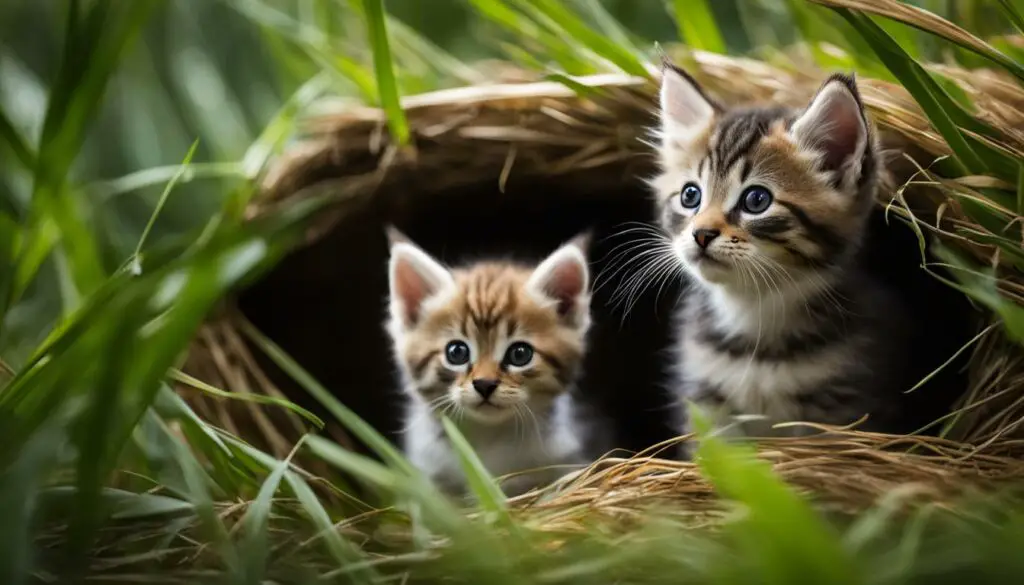Hello there! If you’re wondering when it’s appropriate for a kitten to leave its mom, you’re in the right place. I’m here to provide you with all the information you need to ensure the well-being and development of these adorable little furballs. Kittens are incredibly precious, and it’s important to give them the best start in life. Let’s delve into the topic and explore when the right time is for a kitten to leave
its mother.Key Takeaways:
- The ideal age for a kitten to leave its mother is around 12 to 13 weeks.
- Kittens learn important social skills, boundaries, and behaviors from their mom and littermates.
- Weaning from nursing to solid food usually occurs between 6-8 weeks old.
- Early separation from the mother can lead to health issues and behavioral difficulties.
- Proper socialization and monitoring are crucial for the well-being of kittens separated early.
Importance of Socialization and Learning from Mom
Kittens learn essential social skills and behavior cues from their mother and littermates. During the sensitive socialization period between 2-3 weeks and 9-10 weeks old, kittens experience new things, meet new people, and interact with other animals. This period is crucial for teaching them how to properly respond to humans and animals, accepting food, and developing toilet habits.
Kittens that are separated from their mom too early may struggle with behavior issues, aggression, anxiety, and fear. It is important to allow kittens to be with their mother and siblings to learn these essential skills.
Table:
| Benefits of Learning from Mom | Examples |
|---|---|
| Socialization | Learning to interact with humans and animals |
| Behavior cues | Understanding proper responses and boundaries |
| Feeding habits | Accepting food and developing regular mealtime routines |
| Toilet training | Learning appropriate elimination habits |
By allowing kittens to spend adequate time with their mother, they can develop into well-adjusted and socially confident cats. Kittens that are separated too early miss out on these crucial learning opportunities and may struggle with behavior issues throughout their lives.
Weaning Process and Transition to Solid Food
During the weaning process, kittens transition from nursing to consuming solid food. This is an important stage in their development, as their nutritional needs evolve, and they learn to eat independently. Weaning typically begins around 4 weeks old, when the mother gradually introduces the kittens to solid food while still nursing them.
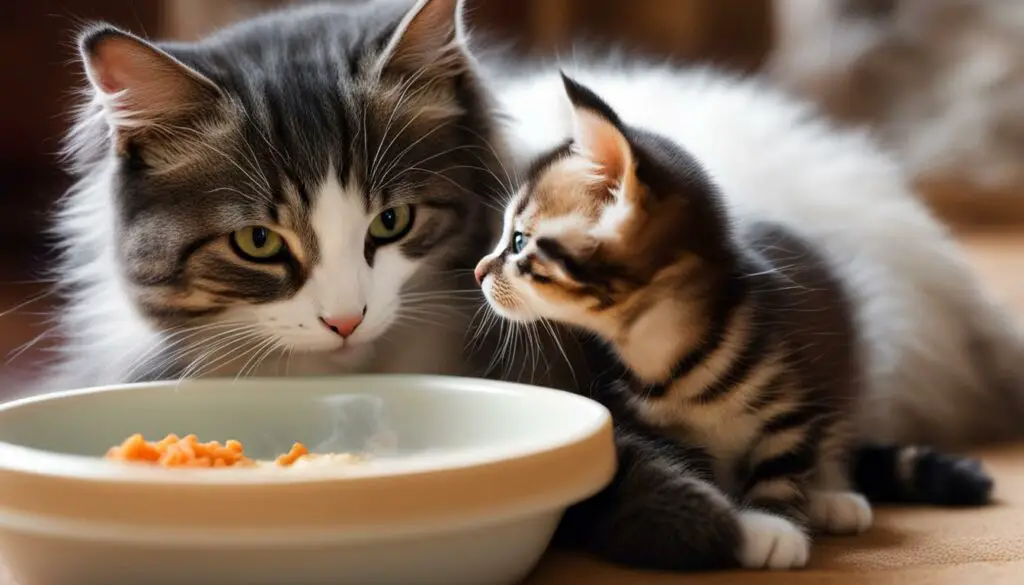
By 6-8 weeks old, kittens are ready to stop nursing altogether, as their baby teeth have come in and they are able to chew and digest solid food. It is crucial to provide specially-formulated kitten food during this transition period. Consultation with a veterinarian is recommended to determine the appropriate feeding schedule and ensure adequate nutrition for the kittens.
| Weaning Process | Transition to Solid Food |
|---|---|
| Starts around 4 weeks old | Kittens stop nursing by 6-8 weeks old |
| Mother gradually introduces solid food while still nursing | Kittens’ baby teeth have come in, and they can chew and digest solid food |
| Specially-formulated kitten food is recommended | Consultation with a veterinarian for feeding schedules and advice |
The weaning process not only marks the transition to solid food but also signifies the beginning of a kitten’s independence. It is a crucial stage in their development, as they learn to meet their nutritional needs through a balanced diet. Additionally, the weaning process allows the kittens to develop their taste preferences and establish healthy eating habits for a lifetime.
Determining Your Kitten’s Age and Abilities
As a responsible pet owner, it is essential to accurately determine your kitten’s age to provide appropriate care and ensure proper socialization and developmental milestones are met. Kittens go through rapid growth and development in their early weeks, and each stage brings unique abilities and milestones.
At around 2 to 3 weeks old, kittens start to show signs of physical and sensory development. Their ears start to unfold, and their eyes gradually open. They begin to crawl and take cautious steps, exploring their surroundings. This is an exciting time as they start to interact with their littermates and learn important social and motor skills. It’s crucial to allow them to continue learning from their mother and siblings during this period as they develop essential behavioral and communication abilities.
Between 4 to 7 weeks old, kittens become more active, playful, and energetic. They start to learn how to groom themselves and become more independent. This is a critical stage for their lifelong behavior and manners. With their mother and littermates, they learn important social skills, such as proper play behavior and understanding boundaries. Kittens separated too early or solo babies may lack these essential abilities and struggle with well-adjusted behavior.
Developmental Milestones:
| Age | Developmental Milestones |
|---|---|
| 2-3 weeks | Ear unfolding, eyes opening, crawling, and cautious steps |
| 4-7 weeks | Increased activity, grooming skills, learning from mother and siblings |
By understanding your kitten’s age and developmental milestones, you can provide appropriate care, socialization, and support their healthy growth. Remember, each kitten is unique, and some may reach milestones slightly earlier or later than others. Consulting with a veterinarian can provide more specific guidance tailored to your kitten’s needs.
Impact of Separation on Health and Nutrition
When kittens are separated from their mother too early, it can have detrimental effects on their health and nutrition. The mother’s milk provides essential nutrients and antibodies that are crucial for a kitten’s growth and immune system. Separating kittens before they have had sufficient time to nurse and receive these important nutrients can result in stunted growth and an increased risk of illness.

Proper nutrition is also vital during the weaning process. Kittens gradually transition from nursing to solid food, and this period requires careful monitoring and appropriate feeding. If kittens are separated too early, they may not have learned how to properly eat solid food, leading to nutritional deficiencies. It is important to provide specially-formulated kitten food and ensure they receive sufficient nutrition for healthy growth and development.
| Health Risks | Monitoring |
|---|---|
| Stunted growth | Regular veterinary check-ups |
| Inadequate nutrition | Vaccinations |
| Increased risk of illness | Deworming |
| Spaying/neutering |
Separation from their mother too early can have long-term consequences for a kitten’s overall health and well-being. It is crucial to closely monitor their health, work with a veterinarian, and provide the necessary care to mitigate potential risks.
Behavioral Consequences of Early Separation
When kittens are separated from their mother too early, they can experience a range of behavioral consequences that may impact their socialization, aggression levels, and fearfulness. Without the guidance and interaction with their mother and siblings, kittens may struggle to develop appropriate behaviors and responses in various situations.
The Impact on Socialization
Socialization is a crucial aspect of a kitten’s development and plays a significant role in shaping their future behavior. When kittens are separated from their mother before the appropriate time, they miss out on critical socialization opportunities. This can result in difficulties in interacting with other cats and humans, leading to shyness and fearfulness in unfamiliar situations.
Additionally, the absence of proper socialization can contribute to aggressive behaviors in kittens. Without learning appropriate boundaries and social cues from their mother and littermates, they may struggle to understand how to interact appropriately with other animals and people. This can lead to defensive or aggressive responses when their personal space is invaded.
Addressing the Consequences
While early separation can have lasting effects on a kitten’s behavior, it is not a lost cause. Extensive socialization and positive reinforcement training techniques can be employed to help kittens overcome these behavioral consequences. Providing a safe and supportive environment, gradually exposing them to new experiences, and rewarding positive behaviors can aid in their development and help them adjust to a variety of situations.
Patience and consistency are key when addressing the behavioral consequences of early separation. It may take time for kittens to learn appropriate behaviors and responses, but with dedicated effort and understanding from their owners, they can develop into well-adjusted cats.
Challenges of Weaning and Litter Training
As kittens continue to grow and develop, they undergo the important process of weaning and learning how to use the litter box. Weaning involves transitioning from nursing to solid food, while litter training involves teaching kittens to use the litter box for elimination. These processes can present challenges when kittens are separated from their mother too early.
When kittens are separated from their mother before they have fully learned how to use the litter box, they may struggle with proper elimination habits. They may not instinctively know to use the litter box or may have accidents outside of it. Additionally, without their mother’s guidance, kittens may take longer to learn how to properly bury their waste.
To help kittens adjust to litter training, owners can provide a low litter box filled with a kitten-friendly, unscented litter. Placing the kitten in the litter box after meals or naps and gently encouraging them to scratch the litter can help them understand the purpose of the box. Positive reinforcement, such as praise or treats, can also be used to reward them for using the litter box correctly.
It’s important to approach the weaning and litter training process with patience and consistency. Some kittens may take longer than others to fully grasp these skills, especially if they were separated from their mother at an early age. With time, guidance, and positive reinforcement, most kittens will eventually learn how to use the litter box and transition to solid food successfully.
Challenges of Weaning and Litter Training
| Challenge | Impact | Solution |
|---|---|---|
| Early separation from mother | Kittens may struggle with litter box use and proper elimination habits. | Provide a low litter box, encourage scratching, and offer positive reinforcement. |
| Instinctual learning from mother | Kittens may take longer to understand the purpose of the litter box and how to bury waste. | Use patience and consistency while guiding kittens to mimic their mother’s behavior. |
| Varying learning speeds | Some kittens may learn more quickly than others, requiring individualized attention and guidance. | Provide consistent training, repetition, and positive reinforcement tailored to each kitten’s needs. |
By addressing the challenges of weaning and litter training with patience and consistent training, owners can help kittens develop good elimination habits and successfully transition to solid food. This process may require time and effort, especially for kittens separated from their mother at an early age, but with the right approach, they can learn these important skills and thrive in their new homes.
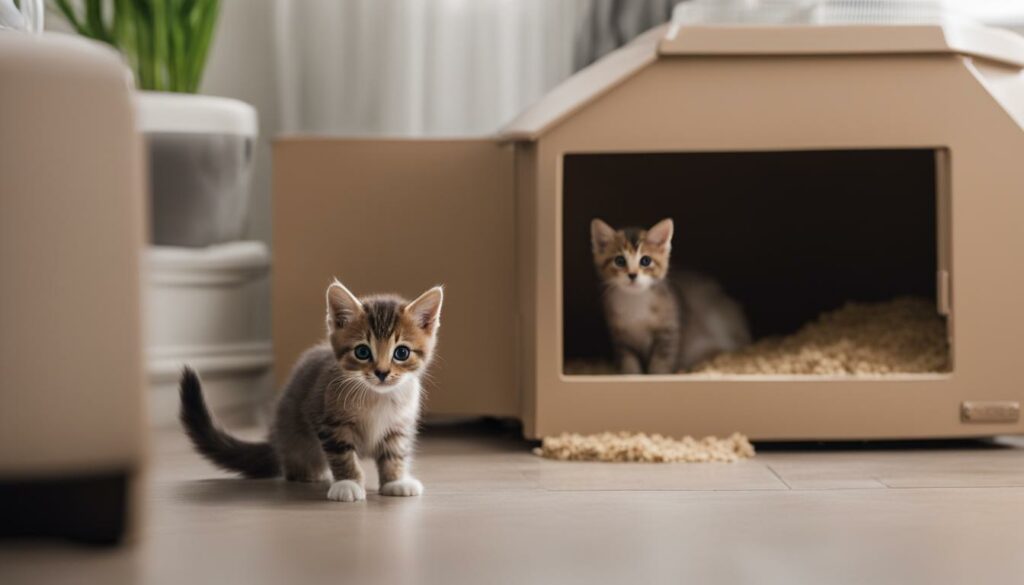
Fostering and Surrogate Parenting for Early Separation Cases
When kittens are separated from their mother too early, fostering with a lactating cat or becoming a surrogate parent becomes crucial to their well-being. Fostering provides them with the opportunity to receive necessary nutrition and socialization from a mother cat. In these cases, bottle feeding with kitten milk replacement formula is essential to ensure their proper nutrition.
Fostering requires dedicated time and effort from human caretakers. It involves feeding the kitten, stimulating their elimination, and providing them with socialization opportunities. Professional veterinary assistance is recommended to guide and provide advice throughout the fostering process.
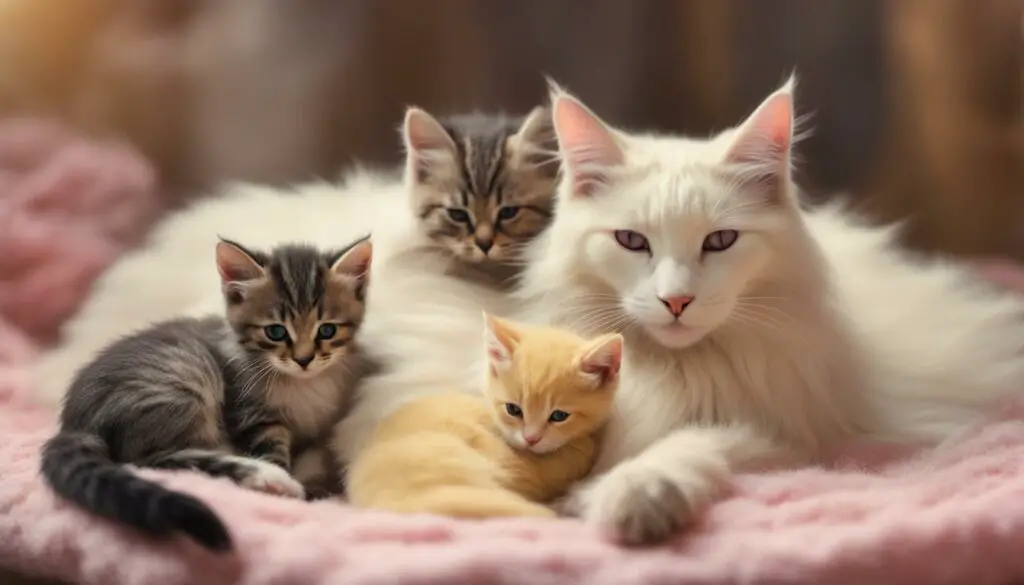
Health Risks and Monitoring for Early Separation Kittens
When kittens are separated from their mother too early, they may face health risks and require special monitoring and care. Early separation can impact their overall development, making it important to closely observe their health and well-being. Veterinary care is essential in ensuring their proper growth and addressing any potential health issues.
One of the main health risks for early separation kittens is the lack of proper nutrition. Kittens rely on their mother’s milk for essential nutrients and antibodies that boost their immunity. When they are separated too soon, they may not receive the necessary nutrients, which can lead to stunted growth and increased susceptibility to illnesses. Regular veterinary check-ups and nutritional supplementation are crucial in supporting their health.
Monitoring the development of early separation kittens is also important. These kittens may experience delayed physical and behavioral milestones compared to those who stay with their mother and littermates for a longer duration. It is essential to track their progress, ensuring that they are meeting appropriate milestones and receiving necessary interventions if they are falling behind.
Veterinary care plays a significant role in the health and well-being of early separation kittens. Regular check-ups, vaccinations, and deworming treatments are vital in preventing diseases and ensuring their overall health. Spaying or neutering should also be considered to prevent unwanted pregnancies and reduce the risk of certain reproductive-related health issues. By closely monitoring their health and working closely with a veterinarian, early separation kittens can have the best chance at a healthy and happy life.
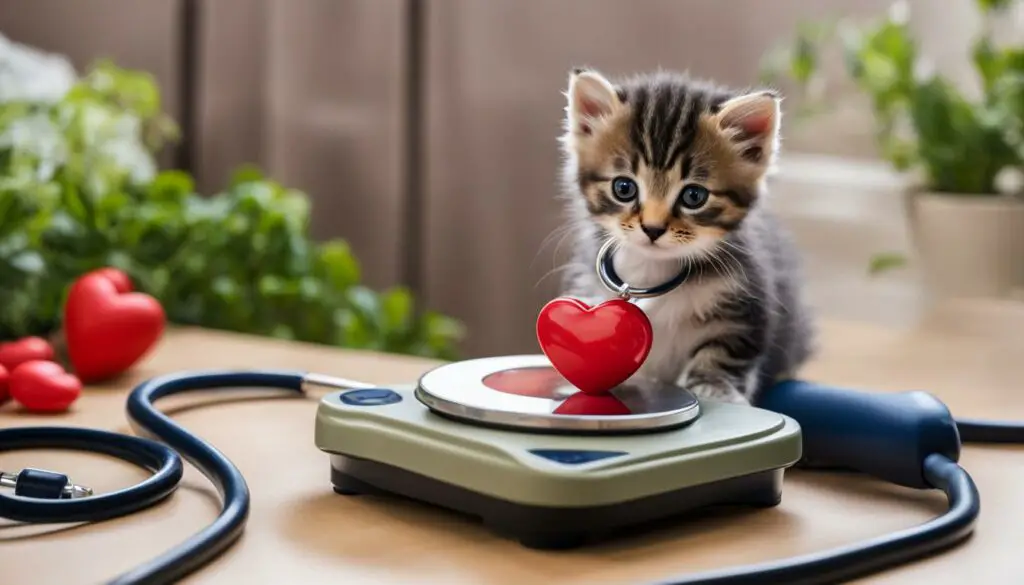
Table: Common Health Risks for Early Separation Kittens
| Health Risk | Symptoms | Treatment |
|---|---|---|
| Poor nutrition | Stunted growth, lack of energy, weakened immune system | Nutritional supplementation, appropriate kitten food |
| Delayed development | Slow physical and behavioral milestones | Regular monitoring, intervention if necessary |
| Increased susceptibility to illnesses | Frequent infections, weakened immune system | Vaccinations, regular veterinary check-ups |
| Reproductive-related health issues | Unwanted pregnancies, certain diseases | Spaying/neutering, veterinary consultation |
Adjusting to a New Home for Early Separation Kittens
Bringing home a new kitten is an exciting time, but for kittens that have been separated from their mother too early, the adjustment process may be a bit more challenging. It’s important to remember that these kittens have not had the same level of socialization and learning opportunities as those who stayed with their mother and littermates for a longer period. Here are some tips to help your early separation kitten adjust to their new home:
Creating a Safe Space
Provide a warm and secure environment for your new kitten to help them feel safe and comfortable. Set up a designated area with a litter box, food, water, and a cozy bed where your kitten can retreat to when they need some alone time. It’s also a good idea to provide some hiding spots, such as cardboard boxes or cat tunnels, where your kitten can feel secure. Gradually introduce them to the rest of your home once they have become familiar with their safe space.
Gradual Socialization
Socialization is key for early separation kittens, as they may not have had as many opportunities to interact with other cats and humans. Start by slowly introducing your kitten to new experiences and people in a calm and controlled manner. Allow them to approach and interact at their own pace, and always reward positive behavior with treats and praise. It’s important to be patient and understanding, as it may take some time for your kitten to feel comfortable and confident in their new surroundings.
Bonding and Playtime
Bonding with your early separation kitten is essential for building trust and confidence. Spend quality time playing with them using interactive toys and engaging in gentle play. Use positive reinforcement to reward good behavior and provide plenty of affection and attention. This will help strengthen the bond between you and your kitten and make them feel more secure in their new home.
| Tip | Description |
|---|---|
| 1 | Introduce your kitten to new experiences gradually and at their own pace. |
| 2 | Provide a warm and secure environment with designated areas for eating, sleeping, and using the litter box. |
| 3 | Play and bond with your kitten using interactive toys and positive reinforcement. |
By following these tips, you can help your early separation kitten adjust to their new home and provide them with the love and care they need to thrive. Remember to be patient and understanding during the adjustment period, and seek guidance from a veterinarian or animal behaviorist if needed. With time and proper socialization, your kitten will grow into a happy and well-adjusted adult cat.
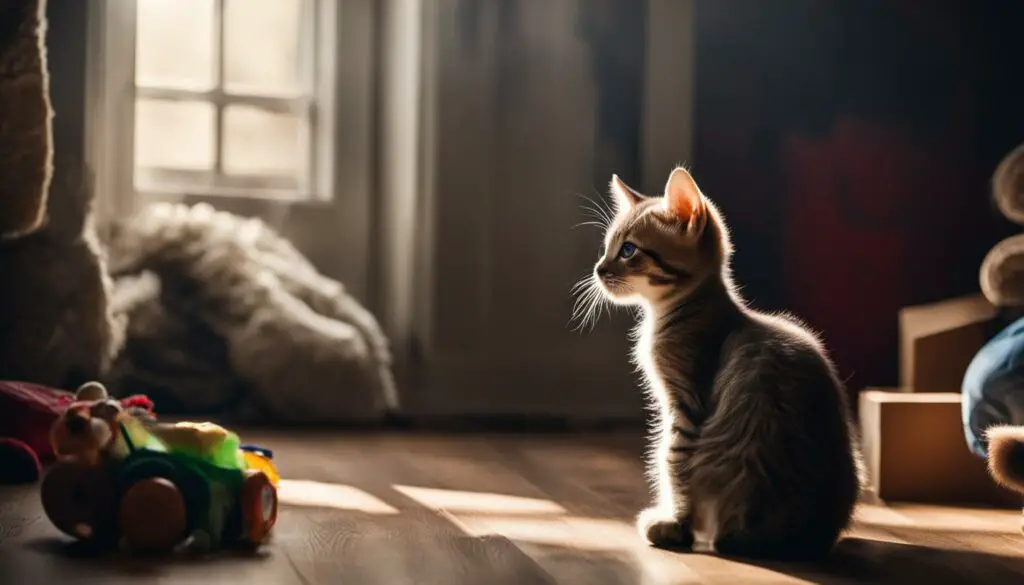
Importance of Patience and Further Learning Beyond Kittenhood
Patience plays a crucial role in the development of kittens, especially those who were separated early from their mother. While early separation can present challenges, it is still possible for these kittens to learn and grow beyond their kittenhood. It is important for owners to approach their care with understanding and patience, allowing them the time and opportunities to develop into well-rounded adult cats.
One aspect to consider is continued socialization. Kittens that were separated early may need extra exposure to different environments, people, and other animals to develop proper social skills. By providing positive experiences and gradually introducing them to new situations, owners can help these kittens become more confident and comfortable in their surroundings.
Additionally, ongoing learning and training can help these kittens overcome any behavioral issues that may arise from early separation. Positive reinforcement techniques, consistency, and understanding are key in shaping their behavior and teaching them appropriate manners. By investing the time and effort to train and guide these kittens, owners can help them develop into well-adjusted and happy adult cats.
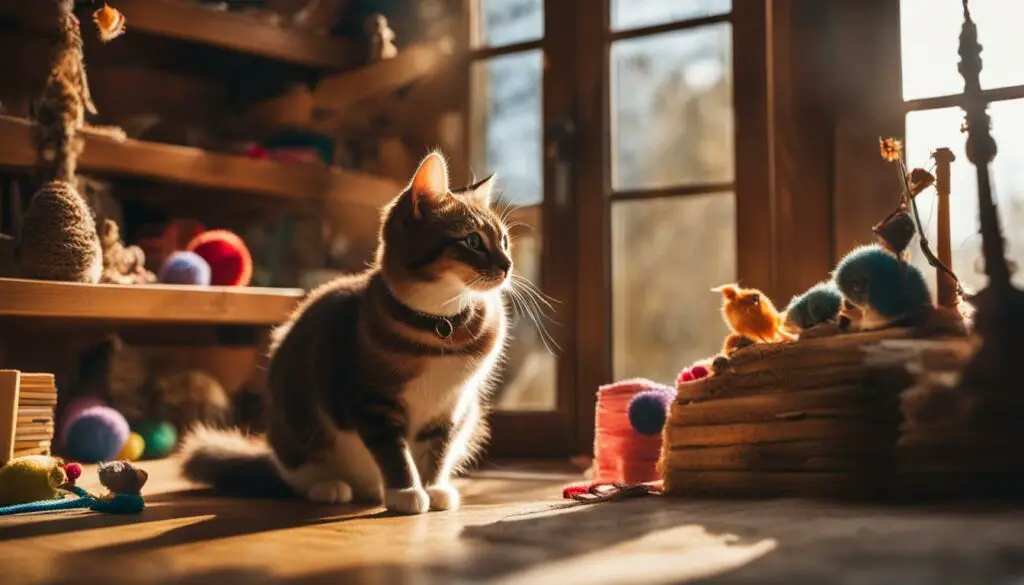
The Importance of Continued Learning
Beyond their early weeks, kittens continue to learn and develop throughout their lives. It is important for owners to engage in ongoing enrichment activities and provide mental stimulation to keep their cats’ minds active and prevent boredom. This can include puzzle toys, interactive play sessions, and introducing new experiences to keep their curiosity alive.
Furthermore, learning extends beyond just behavior. Cats are intelligent creatures capable of learning new tricks and commands. With patience and positive reinforcement, owners can teach their cats various skills, such as using a scratching post, walking on a leash, or performing simple tricks. These opportunities for continued learning provide mental and physical stimulation for cats, promoting their overall well-being.
In conclusion, while early separation may present challenges, it is important to remember that kittens have the capacity to learn and develop beyond their early weeks. With patience, understanding, and ongoing training, these kittens can grow into well-adjusted adult cats. By providing them with socialization, enrichment, and continued learning opportunities, owners can help their cats thrive and lead fulfilling lives.
Ideal Age for Kittens to Leave Their Mom
When it comes to determining the ideal age for kittens to leave their mother, it is crucial to consider their overall development, behavior, and socialization needs. While kittens can physically survive without their mom at around 8 weeks, it is recommended to wait until they are around 12 to 13 weeks old before separating them. This extended period allows for complete physical and behavioral development, ensuring that the kittens are well-prepared for their new homes.
By staying with their mother and littermates for this duration, kittens receive essential nutrients and learn vital social skills. They have the opportunity to interact with their siblings, learning important behaviors and boundaries through play and observation. This socialization with other cats and exposure to various environments during this critical period contributes to the development of confident and well-adjusted cats.
It’s important to note that waiting until 12-13 weeks also allows for proper human interaction and bonding. Kittens that are separated too early may struggle with adjusting to a new home and bonding with their new family. By giving them a few extra weeks with their mother, they have more time to develop trust and feel secure in their new environment.
Benefits of Waiting Until 12-13 Weeks
Waiting until the ideal age of 12-13 weeks to separate kittens from their mother offers several benefits. Here are some key advantages:
- Complete Development: Kittens experience rapid growth and development during their early weeks. Waiting until 12-13 weeks ensures that they have reached their full physical maturity and are ready to handle the transition to a new home.
- Behavioral Stability: Staying with their mother and littermates allows kittens to learn important social skills and proper behaviors. They have the opportunity to observe and imitate their mother’s actions, setting a solid foundation for well-adjusted behavior in their future homes.
- Health and Nutrition: Kittens rely on their mother’s milk for essential nutrients and antibodies. An extended stay with their mom ensures that they receive proper nutrition for healthy growth and development.
- Positive Human Interaction: Waiting until 12-13 weeks provides more time for kittens to interact with humans in a safe and nurturing environment. This helps them build trust, become accustomed to human touch, and develop positive socialization skills.
Overall, the ideal age for kittens to leave their mother is around 12 to 13 weeks. This additional time allows for complete physical and behavioral development, proper socialization, and a smoother transition to their new homes. By prioritizing their well-being and providing them with ample time to grow and learn, we set them up for a lifetime of happiness and companionship.
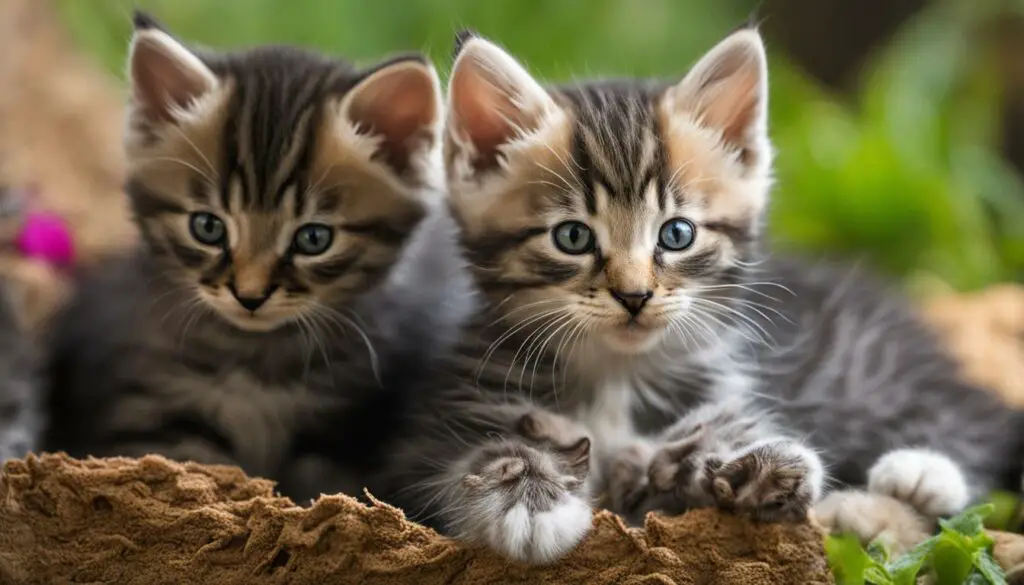
Conclusion
In conclusion, the appropriate age for a kitten to leave its mother is around 12 to 13 weeks. During this extended period, kittens have the opportunity to fully develop physically, mentally, and socially. Staying with their mother and littermates allows them to learn essential social skills, boundaries, and behaviors that are crucial for their overall well-being.
Early separation from their mother can have negative consequences on a kitten’s health, behavior, and ability to adjust to a new home. Kittens that are separated too soon may struggle with aggression, fearfulness, and improper grooming habits. They may also experience stunted growth and increased risk of illness due to inadequate nutrition.
Proper socialization, nutrition, and monitoring are essential for the well-being of early separated kittens. By providing a warm and secure environment, adequate nutrition, and positive reinforcement training, owners can help these kittens adjust and thrive in their new homes. It is important to be patient, understanding, and consistent in their care to ensure they become well-adjusted and confident adult cats.
Ultimately, by prioritizing the development, socialization, and nutrition of kittens, we give them the best chance for a healthy and happy life. Taking the time to allow kittens to stay with their mother and littermates until they are fully ready to leave ensures that they have the necessary skills and foundation to thrive as they grow into adult cats.
FAQ
When is the appropriate time for a kitten to leave its mom?
The ideal age for a kitten to leave its mom is around 8 to 10 weeks, although it is recommended to keep them with their mom and littermates until at least 12 to 13 weeks old.
Why is socialization and learning from mom important for kittens?
Socializing with their mom and littermates helps kittens develop essential social skills, boundaries, and behavior cues that are crucial for their overall well-being and behavior towards humans and other animals.
How does the weaning process and transition to solid food work?
Kittens start the weaning process at around 4 weeks old, gradually transitioning from their mother’s milk to solid food. By 6 to 8 weeks old, they are typically ready for a diet of solid food.
How can I determine my kitten’s age and abilities?
By observing developmental milestones such as opening their eyes, developing teeth, and starting to eat solid food, you can estimate your kitten’s age and understand their abilities and stage of development.
What are the health and nutrition consequences of early separation from the mother?
Separating kittens from their mother too early can result in stunted growth and increased risk of illness due to a lack of proper nutrition from their mother’s milk. Proper nutrition is essential for their healthy development.
What are the behavioral consequences of early separation?
Kittens separated too early may struggle with behavior issues such as aggression, fear, and difficulty interacting with others. They may lack essential social skills and proper grooming habits that they would have learned from their mother and littermates.
How can I handle weaning and litter training for my kitten?
Weaning and litter training should be done gradually and with patience. Providing appropriate kitten food and gently guiding them to the litter box while using positive reinforcement can help them learn these behaviors.
What should be done in cases of early separation from the mother?
In cases where a kitten is separated early, fostering with a lactating cat or becoming a surrogate parent is crucial. Bottle feeding with kitten milk replacement formula and providing socialization opportunities with other kittens are important for their well-being.
What health risks should be monitored for early separation kittens?
Kittens separated too early may be at higher risk for health issues due to inadequate early development and nutrition. Regular veterinary check-ups and appropriate care are necessary to monitor their health and provide any necessary interventions.
How can I help an early separation kitten adjust to a new home?
Patience, understanding, and creating a warm and secure environment are key in helping an early separation kitten adjust to a new home. Providing appropriate nutrition, positive reinforcement, and avoiding sudden changes or stressful situations can aid in their adjustment.
Can early separation kittens still learn and develop new behaviors?
Yes, even if a kitten was separated early from their mother, they can still learn and develop new behaviors with the help of calm and patient owners. Positive reinforcement techniques, consistency, and understanding can help them become well-adjusted adult cats.
What is the ideal age for kittens to leave their mom?
The ideal age for kittens to leave their mom is around 12 to 13 weeks. This extended time allows for complete physical and behavioral development and ensures a healthier, well-socialized kitten.
Source Links
- https://www.dailypaws.com/cats-kittens/health-care/kitten-care/when-can-kittens-leave-their-mom
- https://www.treehugger.com/ways-know-if-your-kitten-was-taken-away-its-mother-too-soon-4868789
- https://www.thesprucepets.com/when-can-kittens-leave-mothers-555163

